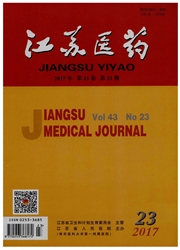

 中文摘要:
中文摘要:
目的探讨合并症对乳腺癌化疗方案选择的影响。方法回顾性分析100例乳腺癌患者资料。均经手术治疗。其中,患有严重内科合并症的患者50例(A组),无合并症的乳腺癌患者50例(B组)。分析两组临床病理特征及合并症是否是乳腺癌化疗方案选择的影响因素。结果两组患者肿瘤大小、病理分级、淋巴结状态、雌激素受体(ER)、孕激素受体(PR)和人表皮生长因子受体2(HER-2)等指标均无统计学差异(P〉0.05)。A组化疗率低于B组(42%vs.60%)(P〈0.05),且更倾向于采用蒽环或紫衫类只含其中一种药物的化疗方案。合并症是选择乳腺癌化疗方案的重要影响因素(OR=5.116,P〈0.01)。结论有无合并症是影响乳腺癌患者选择化疗方案的重要因素。
 英文摘要:
英文摘要:
Objective To investigate the effect of comorbidities on the choice of breast cancer chemotherapy regimens. Methods Data of 100 patients with breast cancer after surgery were retrospectively analysed, tn whom 50 cases with severe or multiple comorbidities (group A) and 50 cases without any comorbidity (group B). The influences of clinicopathological features and comorbidity on the choice of chemotherapy regimens for breast cancer were analyzed. Results There were no significant differences in tumor size, pathological grade, lymph node status, estrogen receptor, progestrone receptor and human epidermal growth factor receptor-2 between two groups(P〉0. 05). The chemotherapy rate was significantly lower in group A than that in group B(42% vs. 60%) (P〈0. 05). The patients in group A inclined more to have a chemotherapeutic regimen containing anthracycline or taxol alone rather than using both of them. Comorbidity was an important factor for the selection of chemotherapy regimens (OR=5. 116, P〈0. 01 ). Conclusion Comorbidity is an important factor to influence the selection of chemotherapy regimens.
 同期刊论文项目
同期刊论文项目
 同项目期刊论文
同项目期刊论文
 Preoperative core needle biopsy is accurate in determining molecular subtypes in invasive breast can
Preoperative core needle biopsy is accurate in determining molecular subtypes in invasive breast can 期刊信息
期刊信息
